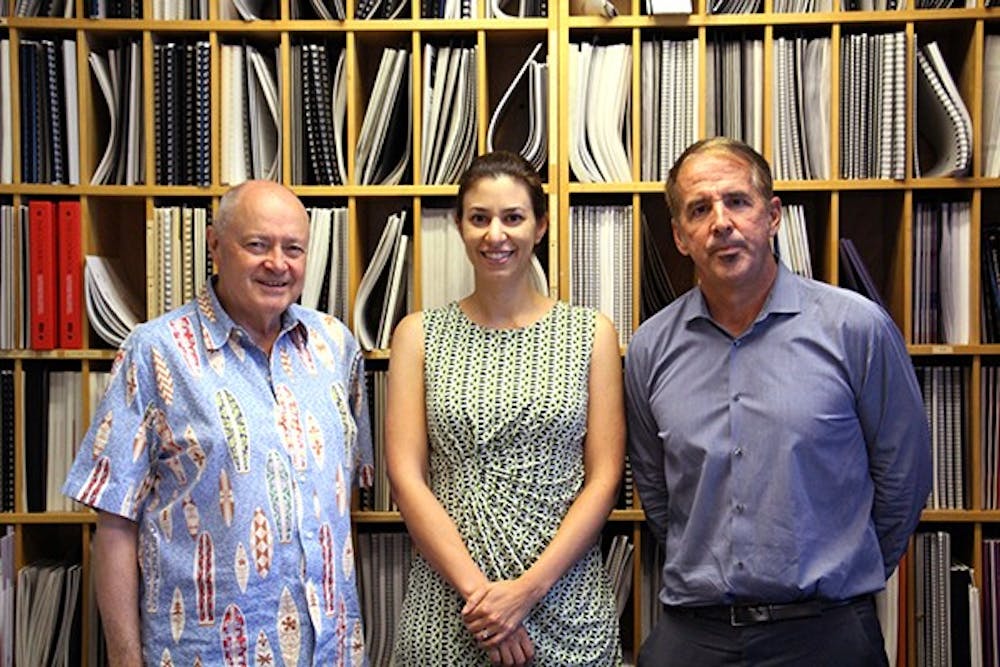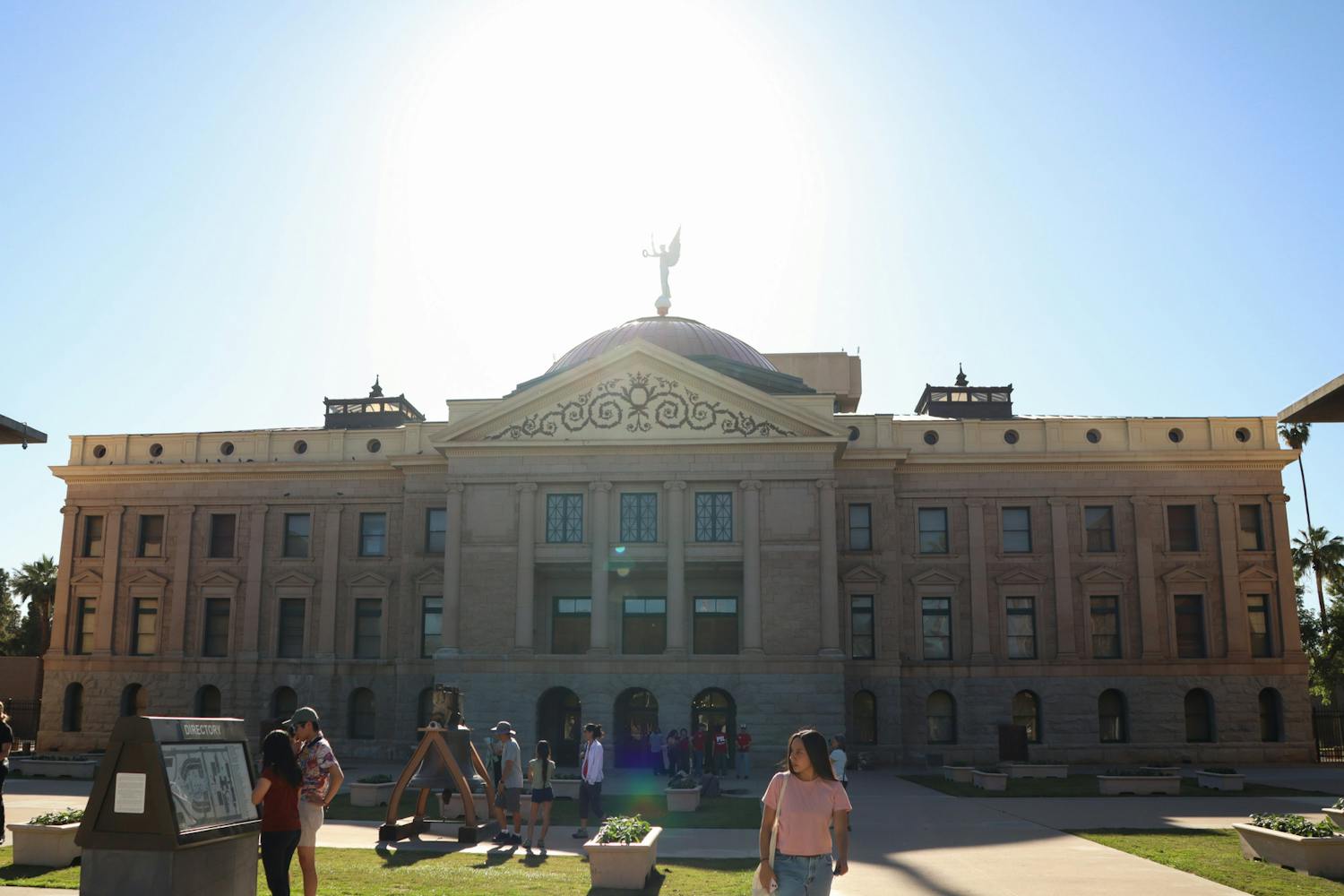 Morrison Institute's (left to right) Associate Director David Daugherty, Project Manager Andrea Whitsett, and Director Thom Reilly will help the institute host Arizona's first ever Citizens' Initiative Review, Sept. 18-21. The event will be held in the Arizona Convention Center, where citizens will focus on the Phoenix city government pension reform proposition. (Photo by Tynin Fries)
Morrison Institute's (left to right) Associate Director David Daugherty, Project Manager Andrea Whitsett, and Director Thom Reilly will help the institute host Arizona's first ever Citizens' Initiative Review, Sept. 18-21. The event will be held in the Arizona Convention Center, where citizens will focus on the Phoenix city government pension reform proposition. (Photo by Tynin Fries)ASU’s Morrison Institute for Public Policy is working to engage Phoenix residents in a form of direct democracy and increase the public’s voice by educating and informing residents on the issue of public pensions.
The institute is partnering with Healthy Democracy to put on a Citizens’ Initiative Review, which will present all the facets of an issue to a small representative group of Phoenix residents who will then publish their collective findings on the issue.
Thom Reilly, director of the Morrison Institute, said the issue of public pensions is very critical across the nation, but it has not been fully addressed by elected officials or unions, and cities have been adding citizens' initiatives to try and find a solution.
“It’s not just a Phoenix single issue; it’s an issue that’s popping up all across the United States, and although the recession was not the cause of the problems, it exacerbated the problems cities and municipalities and states face as they try to fund retirement systems for their employees,” Reilly said.
The CIR, which will be held Sept. 18-21 at the Phoenix Convention Center, began with random outreach to 5,000 registered Phoenix voters. During this time, each voter received a recruitment letter, which explained the process of the CIR, as well as a questionnaire pertaining to basic demographic information.
From those who responded to the questionnaire, 20 anonymous voters who best reflected the demographics of Phoenix based on attributes such as gender, party affiliation, race, ethnicity and educational attainment were chosen. These voters make up the citizens’ panel.
The citizens’ panel will spend three and a half days learning intensively about pension reform in Phoenix from experts, both on how the initiative process works, and with background information on public pensions.
“They spend 90 minutes getting to ask questions of subject matter experts who speak to the measure itself, and then (have) another opportunity to speak with subject matter experts around implementation, and what the potential effects would be if the measure passes,” Andrea Whitsett, special projects manager for the Morrison Institute, said.
The panel reviews claim statements for both pro and con sides of the pension argument, which it rates in terms of reliability, and has the opportunity to edit. The panel uses the claims as its basis to formulate questions by voting and through the use of other small group exercises.
The outcome of this work is the citizens’ initiative, which includes key findings, the strongest pro and con arguments and optional additional policy considerations.
“The focus, during that whole process, is really helping the citizens’ panelists understand their role in informing fellow voters,” Whitsett said.
Reilly said he believes the nonpartisan condition of the institute allows it to assist the panel in making informed decisions, without influencing the CIR’s final outcome.
“Our role is to facilitate the civil discourse,” said Reilly. “We don’t have a stake in the outcome. We’re just facilitating and ensuring that the deliberations are civil.”
The Morrison Institute's Associate Director David Daugherty agrees.
“We’re a neutral third party, we’re a public policy institute that doesn’t have a political agenda, a political leaning, and (Healthy Democracy) wanted someone like that to facilitate the process,” he said.
The CIR’s process is based on a similar event held by Healthy Democracy in Oregon. Having witnessed the event in Oregon, Whitsett was pleased with the panel members’ objectivity in considering the issues without attempting to advance their own personal agendas.
The CIR in Phoenix will focus on the discussion of pension reform. Specifically, the panel will consider the benefits and drawbacks of private and public benefit systems.
Benefit systems come in two forms: defined benefit and direct benefit.
While both are formulas for calculating one’s retirement, defined benefit is based upon the number of years one has worked, one’s salary, and a formula which has been put together by the municipality or state.
Direct benefit is a system in which employees match the employer's contributions, placing the investment risk with the individual, rather than the municipality.
As national debt increases, municipalities have trouble funding their defined benefit programs; therefore, much of the CIR’s discussion will debate whether or not Phoenix should shift toward a greater direct benefit program, said Reilly.
“Phoenix is seen as one of the early municipalities, and many individuals and states and cities across the United States are looking at the outcome of this to determine if a like initiative should be (used) in other places,” Reilly said.
The Morrison Institute encourages students to attend the CIR event, Reilly said.
“If you’re going to be part of a democracy, you need to spend the time. ... This is the process that helps move that forward,” said Reilly.
Reach the reporter at ekamezak@asu.edu or follow her on Twitter @emikamezaki




